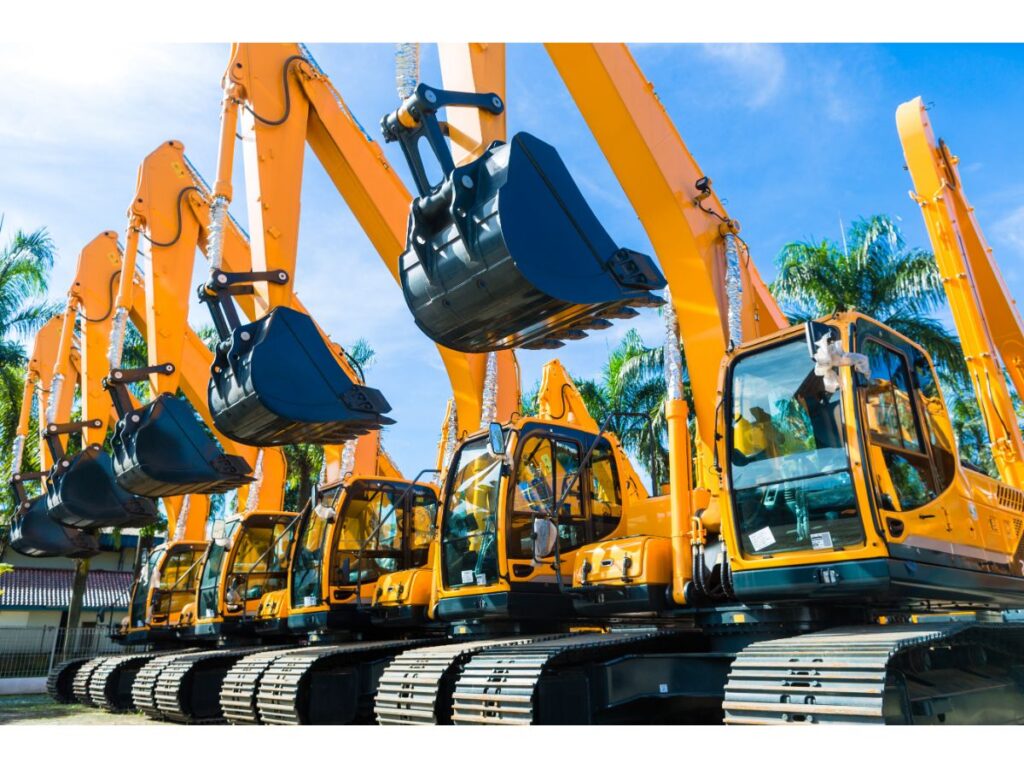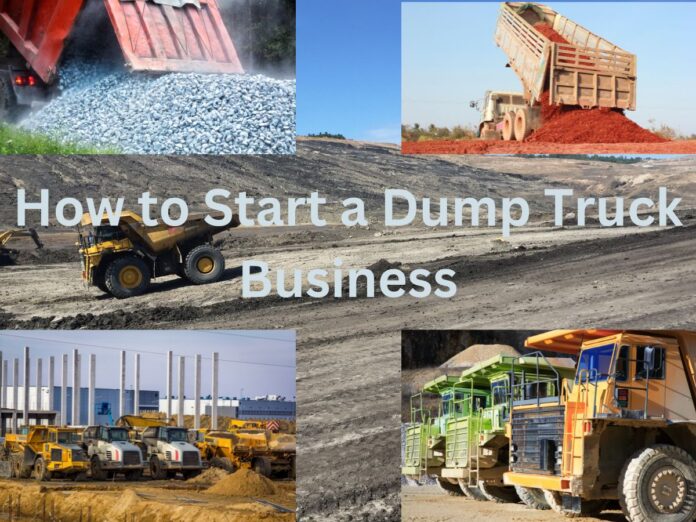A dump truck business is a business that transports loose materials including sand, gravel, soil, boulders, and rubbish. Dump trucks have a hydraulic bed that can be lifted and inclined, allowing them to offload freight swiftly and efficiently. Dump truck companies can operate on its own or as part of a larger construction or trucking company.
Dump trucks are commonly employed in construction, landscaping, and other industries that require bulk material transportation. Dump truck companies, in general, provide an important service by carrying goods to and from job sites, so contributing to the smooth and effective operation of numerous industries
In this blog post, we’ll go through how to launch a dump truck business in this blog post and provide you all the details you need to get going. We’ll go through all the crucial elements of starting and operating a prosperous dump truck business, from funding possibilities and licensing needs to equipment and marketing tactics.
Quick Overview
Here’s the revised table with shorter points:
| Step | Key Points | Challenges | Tips & Tricks |
|---|---|---|---|
| 1. Market Overview | – Understand market demand. | – Saturated market with competition. | – Identify niche markets for opportunities. |
| 2. Business Plan | – Outline goals, target market, and financial projections. | – Lack of industry knowledge and experience. | – Seek Professional guidance. |
| 3. Investment Required | – Determine startup costs. | – Limited access to capital, high upfront costs. | – Explore financing options, consider used equipment. |
| 4. Equipment and Supplies | – Determine truck types and numbers. | – High costs for purchase and maintenance. | – Consider leasing, regular maintenance. |
| 5. Business Location | – Identify areas with construction activities. | – Limited availability, high competition. | – Research zoning regulations, proximity to customers. |
| 6. Funding Options | – Explore business loans, financing, investors. | – Strict lending criteria, difficulty securing funding. | – Strong business plan, alternative financing options. |
| 7. Insurance | – Obtain necessary coverage. | – High premiums. | – Shop around, consider bundling policies. |
| 8. Running a Dump Truck Business | – Efficient scheduling, maintenance, communication. | – Managing unpredictable demand, fuel costs. | – Use software for scheduling, regular maintenance. |
| 9. Employee Management | – Hire qualified drivers, manage schedules. | – Driver shortage, high turnover rate. | – Offer competitive wages, training, positive work culture. |
| 10. Legal and Regulatory Requirements | – Obtain licenses, permits, comply with regulations. | – Changing regulations, compliance. | – Stay updated, attend seminars, consult professionals. |
| 11. Identifying Potential Customers | – Target construction, landscaping businesses. | – Building initial client relationships. | – Network, advertise, provide excellent service. |
| 12. Marketing and Advertising | – Utilize online platforms, social media, targeted ads. | – Limited marketing budget, competition. | – Communicate unique value, showcase testimonials. |
| 13. Networking and Associations | – Join industry associations, attend trade shows. | – Time and cost for networking activities. | – Prioritize relevant events, active participation. |
Step 1. Market Overview
In the United States, the dump truck industry is an essential part of the construction and transportation industries and is witnessing year on year growth
The expansion of the dump truck industry in the United States can be ascribed to an increase in construction and infrastructure projects, as well as an increase in mining and quarrying activities around the country. The construction industry is likely to fuel demand for dump truck services in the future, with the US Bureau of Labor Statistics estimating a 5% increase from 2019 to 2029.
The dump truck sector in the United States is highly competitive, with numerous small and medium-sized enterprises operating. The market is fragmented, and no single corporation dominates it. Dump truck services demand varies by area, with states such as Texas, California, and Florida having more demand due to massive development projects.
Step 2. Create an Effective Business Plan
Creating a business plan is a critical step in launching a dump truck company. Here are some reasons why
Provides a road map: A business plan functions as a road map for your dump truck firm. It outlines your objectives, strategies, and action plans for achieving those objectives. It keeps you focused and on track to meet your business objectives.
Helps secure financing: A well-prepared business plan will assist you in obtaining finance for your dump truck business. Banks and other lending institutions typically require a business plan before they will consider making a loan to you.
Identifies prospective obstacles: A business plan might assist you in identifying potential challenges in your dump truck business. This enables you to devise solutions to overcome such obstacles and reduce their influence on your organization.
Evaluates market opportunities: A business plan can assist you in evaluating market potential for your dump truck business. It enables you to investigate and analyze market trends, rivals, and client needs in order to establish your company’s feasibility.
Sets realistic financial goals: A business plan assists you in setting realistic financial goals for your dump truck business. It helps you to estimate your startup costs, running expenses, and predicted revenue to calculate your business’s profitability.
Startup Stunners has been providing high-quality business plan writing services for years, and we’re ready to assist you in developing a complete, effective strategy that will move your company ahead.
Our team of professionals is committed to assisting you in achieving your company objectives and obtaining finance from banks, grants, or other sources. We’re here to help you succeed whether you’re a newbie, entrepreneur, or small company owner. Don’t put it off any longer; visit startupstunners.com/contact-us/ today and let us lead you to success!
Step 3. Investments
1. Start-up costs
Dump Truck: The vehicle is the most expensive initial investment in beginning a dump truck business. Depending on the brand and model, a new dump truck might cost anywhere from $100,000 to $200,000. A secondhand dump truck will cost less, but it will require more upkeep and repairs.
Dump truck insurance is required by law and can range from $5,000 to $10,000 per year, depending on your coverage requirements.
Licensing and Permits: The cost of obtaining the relevant licenses and permits can reach $1,000.
Business Registration: Registering your business with your state can cost anywhere from $50 to $500.
Additional Equipment and Maintenance: Tarps, straps, and shovels will cost roughly $1,000. The truck’s routine maintenance will cost roughly $5,000 each year.
Marketing and Advertising: To attract clients, you may need to invest $1,000 to $2,000 on marketing and advertising.
2. Recurring Charges:
Fuel: Fuel will be your most expensive recurrent expense, and it will fluctuate based on fuel prices and the distance of the load. A dump truck gets 6 to 8 miles per gallon on average.
Maintenance and Repairs: To keep your dump truck functioning effectively, regular maintenance and repairs are required. Budget $5,000 per year for these expenses.
Insurance: As previously stated, dump truck insurance is required by law and can range from $5,000 to $10,000 each year.
Salaries: If you opt to hire a driver, their salaries will be an ongoing expense. Depending on experience and area, dump truck drivers often earn roughly $50,000 per year.
Taxes: You will be required to pay taxes on your earnings and profits. The amount will vary based on the form of your firm and your income level.
Step 4.Equipment and Supplies
1. Dump Trucks
The price of a dump truck can vary based on various aspects, including the truck’s size and capacity, the brand and model, the vehicle’s age and condition, and the location where it is acquired. A new dump truck can cost anywhere between $100,000 and $200,000 or more, whereas a secondhand dump truck can cost anywhere between $30,000 and $100,000 or more.
One of the most important considerations to make when starting a dump truck business is whether to buy or lease the vehicles. When considering between buying and leasing a dump truck, consider the following factors:
Cost: Purchasing a dump truck necessitates a considerable initial expenditure, whereas leasing often necessitates a lower initial investment. However, leasing may be more expensive in the long run because lease payments may exceed the cost of acquiring a truck altogether.
When acquiring a dump truck, the owner has responsibility for upkeep and repairs. Maintenance and repair services may be provided by the leasing business, minimizing the expense and trouble of upkeep.
Flexibility: By leasing a dump truck, the company can lease different types of trucks as needed and upgrade to newer ones more frequently. Owning a dump truck, on the other hand, gives the owner more control over the vehicle, including customizing choices.
Resale Value: When buying a dump truck, the owner may be able to resell the vehicle for a profit later on, however there is no resale value when leasing. The resale value of a dump truck, on the other hand, may be affected by market conditions, vehicle condition, and demand for secondhand dump trucks.
Tax Advantages: Both purchasing and leasing a dump truck may offer tax advantages such as depreciation and interest deductions. The tax benefits may vary depending on the business’s ownership structure, the type of financing used, and other considerations.
2. Other Important Business Equipment
A dump truck business requires additional equipment and tools in addition to dump trucks. Consider the following important pieces of equipment:
Dump truck trailers are used to transport and unload goods that cannot be transported in a dump truck. Dump truck businesses commonly use flatbed trailers, lowboy trailers, and detachable goose neck trailers.
Excavators: These are machines that dig and move soil and other materials. They are required for jobs that require foundation digging or the removal of soil and trash.

Loaders: Loaders are used to transport huge volumes of material from one site to another, such as gravel, sand, or soil. They can also be used to remove snow and do other duties.
Backhoes: Similar to excavators, backhoes are designed for more varied digging activities. They are typically employed for trench digging, tree stump removal, and structural demolition.
Step 5. Business Locations
Suitable locations for starting a dump truck business may vary depending on various factors, such as the local demand for hauling services, the availability of work, and the competition in the area. However, generally speaking, locations that have a high level of construction and infrastructure development tend to have a higher demand for dump truck services. Following locations are worth mentioning:
- Texas – Texas has a booming construction industry, which makes it a prime location for dump truck businesses. Additionally, the state’s size and population create a high demand for hauling services. However, the competition in Texas can be fierce, and the high traffic levels can lead to increased wear and tear on equipment.
- Florida – Florida’s warm climate and growing population make it an ideal location for construction and development. The state is also home to numerous ports and shipping terminals, which can provide opportunities for hauling and transportation. However, the high humidity and saltwater exposure can cause increased maintenance costs for equipment.
- California – California has a large and diverse economy, with numerous industries that require hauling services. The state’s large population also creates a high demand for construction and infrastructure development. However, the cost of living and doing business in California can be high, which may impact profitability.
- North Dakota – North Dakota has seen significant growth in recent years due to its booming oil industry. The state’s remote location and harsh climate can create challenges for equipment maintenance, but the high demand for hauling services and competitive rates can make it a profitable location for dump truck businesses.
Step 6. Funding Options
There are various financial possibilities for beginning a dump truck company, including:
Personal savings: If you have any, it may be a smart idea to use them towards starting your firm. This can help you minimize your debt and gain more control over your business.
Business loans: Business loans can be obtained from a bank or another financial organization. The interest rates and terms of these loans vary based on the lender and your creditworthiness.
Equipment financing: A leasing or financing company can help you finance your dump truck and other equipment. This option allows you to stretch the expense of your equipment over time, which makes managing your cash flow easier.
Crowdfunding: You can raise capital for your business by using crowdfunding platforms. This entails developing a campaign and inviting individuals to invest in your company in exchange for a prize or stock.
Angel investors: You can propose your business concept to angel investors, who are often high-net-worth people who make equity investments in early-stage enterprises.
Venture capital: If your company has strong growth potential, a venture capital firm may be able to provide money. These firms often invest in early-stage startups and businesses with the potential to scale quickly
Step 7. Insurance
Obtaining insurance is a critical first step in beginning a dump truck business. Insurance can assist safeguard your company in the event of an accident, injury, or other unforeseen incident. Here are some insurance options for your dump truck business:
Liability insurance: This sort of insurance protects your company if you are determined to be at fault for causing damage to someone else’s property or injuring someone. It usually covers legal bills, medical expenditures, and damages.
Physical damage insurance: This protects your dump trucks from damage caused by accidents, theft, or other mishaps. It may cover the cost of car repairs or replacement.
Cargo insurance: If your dump truck company transports items for others, cargo insurance can help protect you against cargo damage or loss.
Workers’ compensation insurance: If you have employees, workers’ compensation insurance can assist pay for medical bills and lost wages if they are injured on the job.
Occupational accident insurance: This sort of insurance can cover independent contractors or owner-operators who are not covered by workers’ compensation.
Step 8. Running a Dump Truck Business
1. Planning and dispatching
Scheduling and dispatching are key aspects of running a dump truck company. Here are some pointers on how to successfully schedule and dispatch your trucks:
Employing scheduling software: Consider employing scheduling software to assist you manage your schedule and dispatch your trucks more efficiently. There are various scheduling software choices available to assist you optimise your routes, track your drivers’ hours of service, and increase client communication.
Use GPS Tracking System: Track the position and performance of your trucks using GPS tracking and other monitoring technologies. This might assist you in identifying any challenges or delays and adjusting your timetable as necessary.
Job Assignment: Drivers and vehicles should be assigned to certain jobs based on their availability and skill level. Consider the distance to the task site, the sort of material to be hauled, and the customer’s timing requirements.
Maintain Open Communication: Maintain open communication with your drivers to ensure that they understand their schedules and job responsibilities. Provide clear directions and rules for each job, and ensure that your drivers have the necessary equipment and materials.
Be prepared to adapt your timetable: Be prepared to adapt your timetable as needed to meet unanticipated delays or changes in customer needs. This may need reassigning drivers or trucks to new jobs or modifying your routes.
You may enhance your productivity, lower your costs, and give better service to your clients by successfully scheduling and dispatching your trucks. Make sure to invest in the tools and resources you’ll need to efficiently manage your calendar and dispatch your trucks.
2. Upkeep and Repair
Maintaining and maintaining your dump truck and equipment is critical to the smooth and safe operation of your business. Here are some maintenance and repair advice for your dump truck and equipment:
Make a maintenance schedule: Make a maintenance schedule for your dump truck and equipment and adhere to it on a regular basis. Routine inspections, oil changes, and other maintenance duties fall into this category.
Solve issues as soon as possible: If you spot any problems with your dump truck or equipment, solve them as soon as possible to avoid further damage or safety concerns.
Hire a dependable mechanic Hire a dependable mechanic who has experience working on dump trucks and large machinery
Use high-quality parts and supplies: When repairing or maintaining your dump truck and equipment, use high-quality parts and supplies. This can assist to prevent future problems and guarantee that your equipment functions consistently over time.
Train your drivers and operators: Teach your drivers and operators how to use and maintain your equipment properly. This can aid in the prevention of problems and the extension of the life of your equipment.
You may help minimize safety hazards, save downtime, and extend the life of your dump truck and equipment by periodically maintaining and repairing it. Invest in the resources you need to keep your equipment in good shape, and collaborate with reliable partners to guarantee that it functions smoothly and safely over time.
3. Using Software to Manage your Business
Using software to run your dump truck business can assist you in streamlining operations, lowering expenses, and increasing efficiency. Consider the following software tools:
Use Accounting Software: Accounting software can assist you in managing your finances, tracking spending, and creating invoices. This can assist you in staying on top of your finances and reducing the possibility of blunders.
Use Dispatch Software: Dispatch software can assist you in managing your fleet, scheduling pickups and deliveries, and tracking shipments in real time. This might assist you in increasing efficiency and providing better customer service.
Use GPS tracking software: It can assist you in tracking the location of your dump trucks and equipment, monitoring driving behavior, and optimizing routes. This can help you save money on fuel, improve safety, and provide better customer service.
Use Load Board Software: Load board software can assist you in finding available loads and bidding on tasks. This can help you grow your customer base and revenue.
Use Maintenance Software: It can assist you in tracking maintenance chores, scheduling repairs, and monitoring the status of your equipment. This can aid in the prevention of breakdowns and the reduction of downtime.
Use Safety Management Software: It can help you track safety occurrences, manage compliance, and ensure that your company is fulfilling regulatory standards. This can assist you in reducing risk and improving safety.
You may enhance productivity, cut expenses, and provide better customer service by using software to run your dump truck business. Make sure to carefully weigh your options and select software products that are tailored to your company’s specific requirements. Consider investing in training and assistance to guarantee that you get the most out of your software solutions.
4. How to Determine Dump Truck Hauling Rates
Calculating dump truck hauling rates is an important component of running a successful business. Here are some guidelines to help you figure out your rates:
Determine your costs: The first step in estimating your hauling charges is to figure out how much it will cost you. This includes things like fuel, maintenance, repairs, insurance, and licensing fees.
Estimate your yearly mileage: In order to calculate your costs per mile, you must first estimate your annual mileage. This might assist you in calculating your gasoline prices and other expenses.
Calculate your cost per mile: Divide your total annual costs by your projected annual distance to calculate your cost per mile. This will provide you with a cost per mile that you may use to determine your hauling charges.
Determine your intended profit margin: You must determine your desired profit margin in addition to your costs. This varies depending on the industry and your business objectives, but a typical range is 15-25%.
Calculate your hauling rate: Add your cost per mile to your target profit margin to calculate your hauling rate. For example, if your cost per mile is $1.50 and you want a 20% profit margin, your hauling rate is $1.80 per mile.
It is crucial to note that hauling charges may vary depending on criteria such as the sort of item being hauled, the distance traveled, and the competition in your market. To ensure that you can run a lucrative business, check your rates on a frequent basis and alter them as appropriate.
5. Factors influencing your rates
Several factors can influence your dump truck hauling rates, including:
Material: The sort of material you’re hauling can have an impact on your prices. Higher fees may be justified for materials that are more difficult to transport, require specialized equipment, or offer a larger danger.
Distance: The distance you travel might affect your rates, with longer routes often necessitating higher rates due to increased fuel expenses and truck wear and tear.
Demand: The level of demand in your market can have an impact on your prices as well. You may be able to charge greater prices in locations with strong demand and little competition than in areas with low demand and many rivals.
Seasonality: The time of year might also have an effect on your rates. Construction projects, for example, tend to slow down over the winter months, which might lead to decreased demand and cheaper rates.
The level of competition in your market can also have an impact on your pricing. If there are a lot of competing dump truck companies in your area, you may need to change your prices to stay competitive.
When determining your hauling charges, keep all of these things in mind. You may run a profitable dump truck business by remaining knowledgeable about market conditions and altering your pricing as needed.
Step 9. Employee Management
If your dump truck company expands, you may need to hire and manage staff to meet demand. Here are some pointers on how to hire and manage employees:
Create job descriptions: Create detailed job descriptions for each position in your company, including drivers, dispatchers, and administrative personnel. Outline each position’s responsibilities, qualifications, and criteria in detail.
Job postings: Job postings should be advertised on job boards, social media, and your website. Consider rewarding current employees who refer qualified candidates with referral bonuses.
Conduct Interviews: Conduct thorough interviews with each candidate to analyze their abilities, experience, and fit for your company. Inquire about their driving record, dump truck experience, and availability.
Background checks should be performed on all potential hires to ensure that they have a clean driving record and no criminal past.
Provide comprehensive training: Ensure that new hires understand your company’s operations, safety protocols, and customer service requirements.
Create performance metrics: Create performance metrics for each role to help you measure the performance of your staff. Metrics such as on-time delivery, fuel efficiency, and customer satisfaction might be included.
Offer competitive salary and benefits: To attract and retain top employees, offer competitive remuneration and benefits. Competitive salary, health insurance, and retirement benefits are examples of such perks.
Provide continual feedback and support: Give your staff ongoing feedback and support to help them improve their performance and reach their goals.

By efficiently employing and managing staff, you can enhance your business operations, provide better customer service, and grow your firm over time. Make the necessary investments in resources and training to build a competent and motivated staff.
Step 10. Legal and Regulatory Requirements.
Starting a dump truck business in the USA involves a lot of legal and regulatory procedures. To operate legally and prevent any fines or legal problems, compliance with these regulations is crucial. These are the main factors to think about:
Business Entity Formation: Select your organization’s legal structure, such as a corporation, limited liability company (LLC), partnership, or sole proprietorship.
Business Licenses and Permits: Find out which licenses and permits are required in your state or local authority to run a dump truck business, then apply for them. This can comprise a basic business permit, a registration for a commercial vehicle, and any unique permits required for transporting particular commodities.
Compliance with Federal Motor Carrier Safety Administration (FMCSA) Rules: If your dump truck company conducts interstate commerce or runs across state borders, you must abide by FMCSA rules. This entails acquiring a USDOT number, complying with Hours of Service (HOS) rules, and keeping accurate records of vehicle inspections and maintenance.
Commercial Driver’s License (CDL): Ensure that all drivers working for your dump truck company have a CDL that is currently in good standing. Depending on the kind of vehicle and the goods being transported, different CDL requirements apply. To earn a CDL, drivers must pass both written and practical exams.
Safety Rules: Adhere to safety rules established by government organizations like the Occupational Safety and Health Administration (OSHA). This entails offering suitable safety instruction, upholding a secure work environment, and abiding by rules on load securement and vehicle upkeep.
Environmental Regulations: Federal and state environmental laws must be followed by dump truck companies that transport hazardous items or conduct business in environmentally sensitive locations. For hazardous materials, this involves appropriate handling, disposal, and spill avoidance techniques.
Tax liabilities: Recognize and satisfy all federal, state, and local tax liabilities. This could apply to employment taxes, sales taxes, and income taxes. To ensure compliance with tax laws unique to your company, speak with an accountant or tax expert.
Step 11. Identifying Potential Customers
You can use the following strategies to find potential clients and consumers for your dump truck business:
Investigate local construction companies: Dump trucks are frequently used by construction companies to move supplies, debris, and equipment to and from job sites. Investigate local construction companies in your area and contact them to see if they require your skills.
Look for municipal and government contracts: Cities and government agencies frequently have continuous contracts with dump truck companies to assist with road building, maintenance, and other projects. Check with your local government to see if there are any business prospects.
Connect with landscaping and excavation firms: Landscaping and excavation firms may require dump trucks to move goods, dirt, and debris to and from job sites. Contact these businesses to see if they require your services.
Load boards: Load boards are internet marketplaces that connect shippers and haulage companies. You can find potential clients and customers by signing up for load boards.
Attend local business events and networking opportunities to meet other business owners who may require your services or can refer you to those who do.
To secure continued business, it is critical to maintain ties with your clients and customers. To assist establish a loyal customer base, provide exceptional service, communicate openly and promptly, and maintain competitive rates.
Step 12. Marketing and Advertising your company
Marketing and advertising are critical for spreading the word about your dump truck company and gaining new customers. Consider the following marketing and advertising strategies:
Create a website: A website can assist potential clients in learning more about your company and the services it provides. Make sure your website is mobile-friendly and simple to use. Include your contact information as well as your service regions and charges.
Make professional business cards and flyers: Make professional business cards and flyers to hand out to potential customers. Your company’s name, logo, and contact information should be included in these documents.
Advertising in industry journals: Consider advertising in industry journals that are aimed at construction companies, landscaping businesses, and other possible clients.
Social media marketing: Use social media channels to market your business and engage with potential clients, such as Facebook, Twitter, and LinkedIn. Share updates about your company as well as industry news and tips.
Provide referral discounts: Provide a referral discount to encourage your satisfied clients to suggest your business to others.
Step 13. Networking and joining industrial associations
Joining industry organizations and networking can help you interact with other dump truck operators, remain up to date on industry developments, and hear about prospective possibilities. Here are some suggestions for getting active in industry associations and networking:
Join industry associations: By joining industry associations such as the National Dump Truck Association or the American Trucking Associations, you can have access to industry news, conferences, and networking opportunities.
Attend industry events and conferences to network with fellow business owners and possible consumers. These events can be an excellent way to learn about industry trends and prospective possibilities.
Join online communities: Joining online communities such as LinkedIn groups or Facebook groups can help you network with other business owners while also keeping up with industry news and trends.
Participate in industry forums: Online forums like Truckers Report or Trucking boards can help you connect with other dump truck business owners and share information and thoughts.
Attend local business events and networking opportunities to meet other business owners who may require your services or can refer you to those who do.
When networking with other business owners, remember to keep a professional and respectful demeanor. Relationships take time to develop, so be patient and persistent. Networking can assist you in gaining insights into prospective possibilities and problems, as well as learning from the experiences of others.
Conclusion
In conclusion, starting a dump truck business can be a lucrative venture for entrepreneurs who are willing to put in the effort to develop a solid business plan, obtain financing, and navigate the industry’s regulations and safety requirements. With the right equipment, employees, and marketing strategies, a dump truck business can succeed in a competitive market. By following the steps outlined in this article, aspiring business owners can begin the process of launching their own dump truck business and join the ranks of successful dump truck companies across the United States.
Frequently Asked Questions
What is a dump truck business?
A dump truck business is a type of trucking company that specializes in hauling materials and debris from construction sites, mines, and other locations. Dump trucks are equipped with hydraulic lifts that allow the bed to be tilted and the contents to be unloaded.
Is a dump truck business profitable?
Yes, a dump truck business can be highly profitable if managed properly. Profit margins vary depending on factors such as equipment costs, fuel prices, and competition in the market. However, with the right pricing strategy, contracts, and cost management, a dump truck business can be a lucrative venture.
How do I finance a dump truck business?
There are several financing options available for dump truck businesses, including traditional bank loans, equipment financing, and leasing options. It’s important to research and compare different financing options to find the one that works best for your business.
Do I need a commercial driver’s license (CDL) to operate a dump truck?
Yes, a CDL is required to operate a dump truck. The specific type of CDL required depends on the weight of the truck and the type of cargo being hauled.
How do I find clients for my dump truck business?
There are several ways to find clients for your dump truck business, including networking with other industry professionals, advertising your services, and using load boards to bid on jobs. It’s important to build a strong reputation and provide high-quality services to retain clients and attract new ones.
How do I calculate my hauling rates?
Hauling rates are typically calculated based on factors such as the distance of the haul, the weight of the cargo, and the cost of fuel and maintenance. It’s important to research industry standards and competition in your market to determine the appropriate rates for your business.
Do I need to purchase insurance for my dump truck business?
Yes, insurance is essential for a dump truck business to protect against potential liability and damage to equipment. It’s important to research and compare insurance options to find the coverage that best suits your business needs.
What software can I use to manage my dump truck business?
There are several software options available for managing a dump truck business, including dispatching software, invoicing software, and GPS tracking systems. It’s important to research and compare different software options to find the one that works best for your business.






